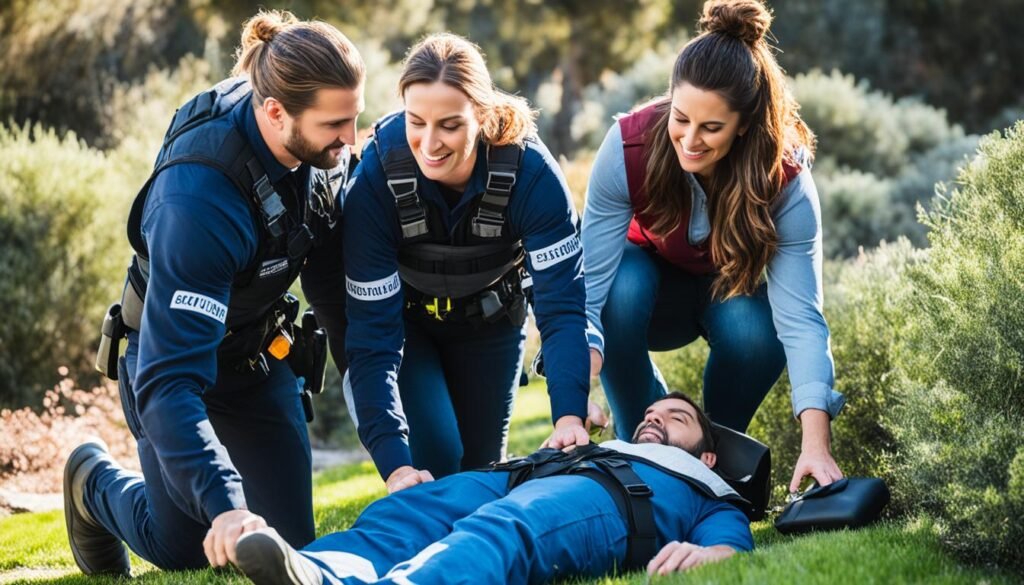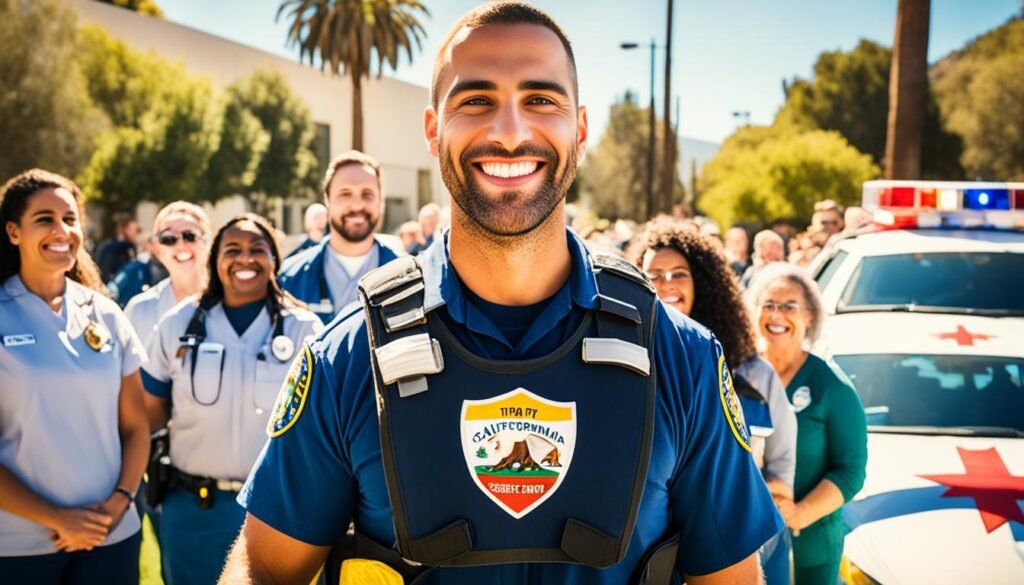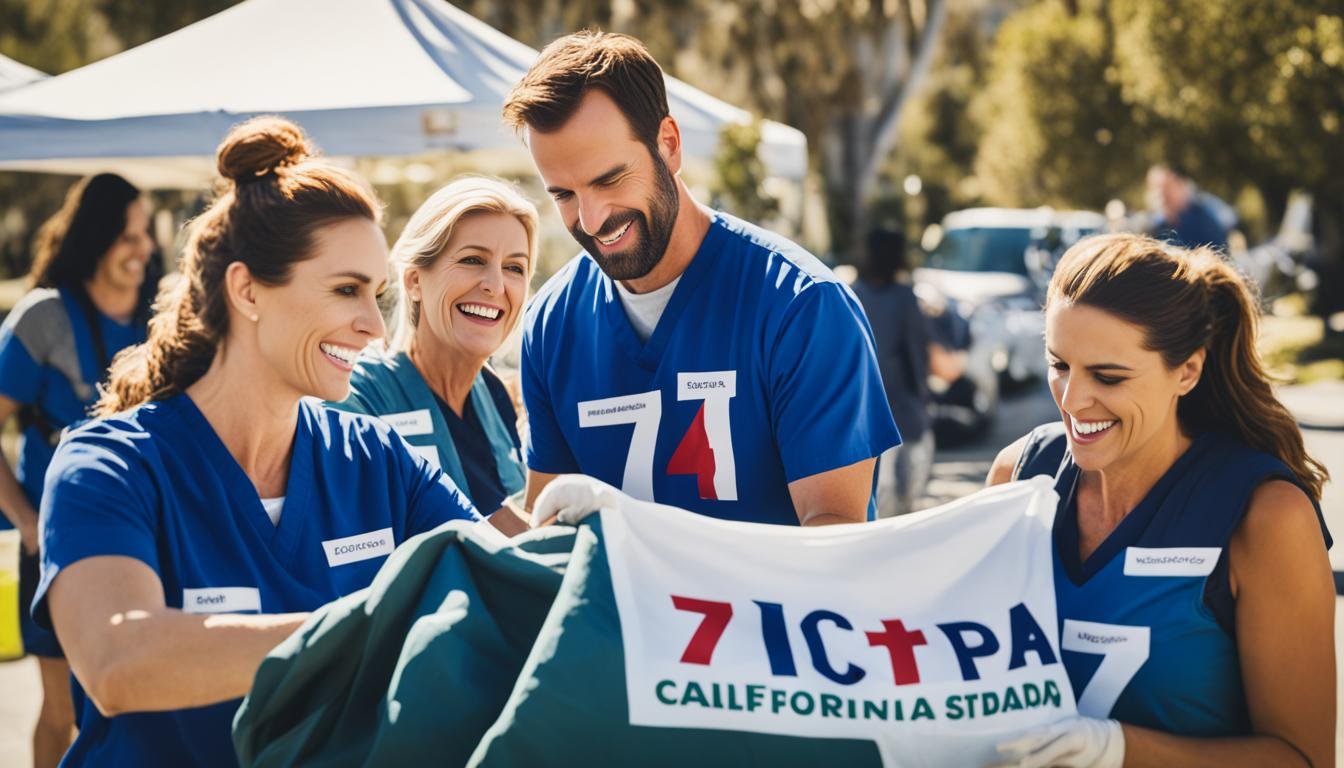In California, many people help others in emergencies every year. They may give CPR, aid someone who is choking, or help in a car crash. These helpers, known as Good Samaritans, save lives. But, not everyone knows that a law protects them. This law is the California Good Samaritan Law. It keeps them safe from being sued if they help someone in a good way.
Key Takeaways:
- The California Good Samaritan Law provides legal protection to individuals who render emergency care or assistance.
- The law covers both medical and non-medical aid.
- Good Samaritans are not liable for civil damages unless they exhibit gross negligence or willful misconduct.
- The law aims to encourage people to assist others in emergency situations without fear of legal repercussions.
- Understanding the provisions and limitations of the law is crucial to ensure protection.
Understanding the Good Samaritan Law in California
The Good Samaritan Law in California protects those who help in emergencies. It’s key to know this law well to understand your rights and its limits.
This law encourages people to help others in need by offering legal protection. However, there are certain conditions to be met for this protection.
To qualify for this law’s protection, help must be offered willingly, without wanting payment, and during an emergency. If you help with a true desire to assist, expecting nothing in return, you’re likely covered. But, you must act carefully and within your skills, as the law doesn’t cover severe negligence or deliberate wrongdoings.
The law treats medical and non-medical help differently. For instance, those providing medical aid like CPR are protected under specific rules. Meanwhile, other forms of help, like calling 911, have their own guidelines.
The Good Samaritan Law doesn’t apply to emergency departments or healthcare facilities. Therefore, if you’re a healthcare worker in such a place, you need to know their emergency care policies.
Important Facts About the Good Samaritan Law in California:
- The law protects individuals who provide emergency aid in good faith and without seeking compensation.
- Coverage under the law applies to both medical and non-medical aid.
- The law does not protect against gross negligence or willful misconduct.
- It is important to act responsibly and within your capabilities when rendering aid.
- The Good Samaritan Law in California does not apply to emergency departments and medical care facilities.

Knowing the Good Samaritan Law in California is vital for emergency helpers. By understanding the law and its rules, you can help others while staying protected.
Key Provisions of the Good Samaritan Law in California
In California, the Good Samaritan Law protects people who help in emergencies. They aren’t responsible for any harm caused by trying to help, as long as their intentions are good and they don’t want payment. Let’s look at the main points of this law:
1. Medical Aid
This law covers those who give medical help during emergencies. It includes medical professionals and regular people giving aid. If you do things like CPR, stop bleeding, or give first aid, you’re protected.
2. Non-Medical Aid
Non-medical helpers are also protected by the Good Samaritan Law. This means if you call for help, comfort someone, or manage danger, your actions are legally protected.
3. Good Faith
To be protected, help must be given with good intentions. This means genuinely wanting to help without expecting anything in return. It shows a true desire to assist others.
4. Absence of Compensation
The law says helpers shouldn’t accept money for their aid. Good Samaritans should help freely, without hoping for any payment. This encourages help based on kindness, not personal benefit.
5. Voluntary Assistance
Those who choose to help in emergencies are covered by this law. It applies whether you’re required to act or not. The law supports individual efforts to help in tough situations.
6. No Gross Negligence
However, the law does not protect extreme carelessness or harmful intentions. If someone acts recklessly or aims to hurt, they can be held responsible. This rule keeps people accountable for their actions.
7. Non-Applicability to Medical Care Facilities
The Good Samaritan Law doesn’t cover emergency rooms or medical centers. Professionals in these places follow different rules. The law mainly helps those aiding outside professional settings.
Knowing about the Good Samaritan Law in California is important for anyone wanting to help in emergencies. By following these rules, you can safely help others in need.

Protecting Good Samaritans in California
The Good Samaritan Law in California aids those who help in emergencies. It keeps them safe from being sued for trying to help, as long as they mean well and don’t want payment.
Knowing about this law is crucial. It enables people to assist others without fear. They know the law backs them up.
Legal Protection Good Samaritan Law
This law covers all kinds of help, medical or not. If you give aid in an emergency, like CPR or at a car crash scene, you’re protected. You must act in good faith and not expect anything in return.
But, there’s a catch. The law does not protect you if you’re very reckless or do something wrong on purpose. If so, you might face legal trouble.
Seeking Legal Advice
If you’re unsure about the Good Samaritan Law, it’s smart to talk to a lawyer. A lawyer can help you understand your rights. Super Lawyers Near Me can connect you with legal experts in California.
When you know your rights and get advice, you can help others confidently. You’ll know the law supports you.
California’s Good Samaritan Law and Its Limitations
In California, the Good Samaritan Law gives legal cover to people who help in emergencies. But, it’s vital to know this law’s limits to understand when it applies and its legal effects.
This law does not cover gross negligence or deliberate harm. If someone does not provide reasonable care or intentionally causes harm, this law will not protect them from civil suits.
The Good Samaritan Law is not for emergency rooms or health facilities. It’s meant for those who offer help at the emergency scene, not in professional healthcare settings.
While this law can protect you from lawsuits, it does not protect against criminal charges. So, if someone commits a crime like theft or assault when helping, they could still be legally charged.
Frequently Asked Questions about the Good Samaritan Law in California:
- Does the Good Samaritan Law protect against gross negligence or willful misconduct?
- No, the law does not provide protection in cases of gross negligence or willful misconduct.
- Does the Good Samaritan Law apply to emergency departments and medical care facilities?
- No, the law specifically excludes emergency departments and other medical care facilities.
- Does the Good Samaritan Law offer protection from criminal liability?
- No, the law does not provide immunity from criminal charges arising from criminal acts committed while providing emergency assistance.
Everyone should get to know the Good Samaritan Law in California well. It helps to know what it covers and its limits. Talking to legal experts can make things clearer. This can help people understand their rights and what they can do.
| Protection | Limitation |
|---|---|
| Protection from civil liability | No protection for gross negligence or willful misconduct |
| Covers medical and non-medical aid | Does not apply to emergency departments and medical care facilities |
| Provides legal immunity | Does not shield against criminal liability |
Conclusion
In California, the Good Samaritan Law gives crucial legal protection to people who help in emergencies. This law encourages people to act responsibly and protects them from being sued for civil damages. If you help someone in need, without expecting anything in return, you’re covered by this law.
But it’s vital to know the law’s limits and what it doesn’t cover. It won’t protect you if you’re grossly negligent or do something on purpose to cause harm. It also doesn’t apply to medical staff in emergency rooms or other healthcare settings. For a full understanding, it’s wise to consult with legal experts, like those at Super Attorneys Of Irvine.
Talking to skilled lawyers can help you know more about the Good Samaritan Law in California and your case. Knowing your legal rights and what protection you have lets you make better choices when helping others. This law aims to back up people who offer help without thinking of themselves.

